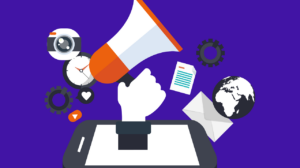According to a report by UpSkill America, 24 million jobs in the United States will disappear due to advancements in artificial intelligence (AI). Robots and AI are quickly changing the way we work.
Automation has already taken a toll on blue-collar jobs. Between 2000 and 2010, approximately 5.6 million manufacturing jobs were lost in the U.S., with 85 percent of these losses from automation and technological change, according to the U.S. Bureau of Economic Analysis.
It’s an unnerving trend we should expect to continue. In UpSkill America’s survey, 69 percent of senior executives said they expect the American workforce will eventually include human employees—and intelligent machines. Seventy-two percent of these executives said artificial intelligence and robotics will drastically reduce the number of middle managers over the next decade.
That’s intimidating and scary, but what does it mean for you?
1. Your job may be at risk. Are you going to stand by and passively wait for technology to replace your job, or are you going to be strategic and find out how you can create a better career?
Just as the Industrial Revolution changed the way we worked, the AI revolution will do the same. Don’t be naïve and think you won’t be affected. You will be. Your role will change. Your responsibilities will change. The way you work will change. Much of what you do now will be taken over by AI. Don’t fool yourself into thinking your job is immune, because all jobs will be impacted by AI.
2. Job responsibilities will change. Those mindless, repetitive tasks that fill up your workdays? They can and will be replaced. Instead, you’ll be responsible for tasks that require your mind: strategic planning, dealing with escalated customer service issues, relationship creation, or visionary planning. But the easy, repeatable, do-in-your-sleep stuff with be handled for you automatically by AI.
3. Companies may disappear. Of the Fortune 500 companies that existed back in 1955, only 54 remain. Ninety-three percent of them have not withstood the test of time. There are a variety of reasons for this, but a refusal to see the future or adapt to changing consumer needs was a significant factor in rendering them nonexistent.
One example of this is Blockbuster Video. Blockbuster was founded in 1985, and in only seven short years, it became the undisputed leader in home movie and video game rentals. The video giant employed almost 85,000 people in nearly 10,000 stores at its peak in 2004.
Six years after reaching its peak, Blockbuster filed for bankruptcy. By 2018, there was only one Blockbuster store left—in Bend, Oregon. Blockbuster’s rise and fall wasn’t about bad management or a refusal to adapt. As new technologies came along, Blockbuster offered video games, video-on-demand, and DVD-by-mail. What they lacked was vision.
Blockbuster could see the need to adapt to current technologies, but they were unable to imagine what might happen many years out. Because of this, its business decisions weren’t based on looking into the future; they were based in the present. Blockbuster focused on Walmart as its main competitor, and it largely ignored Netflix and Redbox.
Like Blockbuster, companies today making millions and billions of dollars could eventually fall victim to their egos.
4. You may need to reinvent yourself. Ask yourself: “What can I do that AI can’t do?” AI can complete tasks. It can write its own software and learn conversational skills. But it doesn’t have EQ (emotional intelligence). Look at your people skills.
Though some of your skills may become redundant, you can interact and motivate people. You can think strategically and be aware of multiple impacts on a decision. You can think in ways AI cannot.
To reinvent yourself, you have to be willing to learn. You have to be willing to take risks, find a mentor, and be honest with yourself about your skills and their place in the future.
5. Human skills will be valued. We must build our human skills at a much higher degree than we’ve been doing. We need empathy, collaborative skills, leadership skills, the ability to inspire and influence, and critical thinking. We need to be able to discern truth from fiction. We need to be more compassionate and relationship-focused.
6. You’ll need to adapt, fast. Companies and employees should be preparing for the consequences of AI. We should expect job disruption—but not fear it. Our past has shown us that we can successfully navigate the changes that are coming, and that we’ll be better off in the long run.
Leaders need to be equipped to navigate this future. It’s not just tasks that are going to change; the way we lead is going to undergo a radical shift as well. Our leaders need to be able to not only anticipate where AI can benefit their companies but also be aware of how AI will affect employees. Leaders need compassion and understanding, as well as decision-making skills and vision.
Both leaders and employees need to be agile and fast-acting so they can quickly change the way they do business as new trends, demands, and technologies are introduced. If you see that the company you’re working for is exploring ways to integrate AI, you should be among the first to jump on that bandwagon and learn as much about it as you possibly can.
AI is changing the way we work and the way we interact. But it doesn’t have to change whether you are employable. Don’t sit back and wait for change to come to you, or you’ll find yourself on the unemployed side of AI. Embrace AI and make it work for you.





